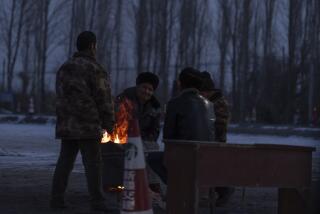CULTURE : China Sees a Muslim Threat From the West
- Share via
BEIJING — In an effort to crush what it claims to be an outbreak of terrorism and separatism, the government has conducted a monthlong crackdown in China’s predominantly Muslim far west, arresting several thousand people from the minority Uighur population and confiscating supplies of weapons and explosives.
According to official reports from the western frontier region of Xinjiang, terrorist acts have included the March 2 assassination of a pro-government religious leader and the May 27 attack on a senior government official and his son.
According to the reports, at least two police officers and 20 civilians have been killed in fighting.
Any attempt to independently gauge the extent of the anti-government activity in the remote territory, however, is difficult.
The spring has always been a time for rebellion in the mineral-rich Central Asian region of desert and mountains, which has never been fully integrated into the Chinese heartland.
Dru Gladney, an expert at the University of Hawaii on Chinese Muslims, who make up about 2% of the population, said the crackdown represents an attempt to “keep a very tight lid” on potential rebel territories of Xinjiang and Tibet as China undergoes a leadership transition and takes control of the British territory of Hong Kong next year.
Requests from foreign reporters to visit the Xinjiang region have been denied by local officials. Western diplomats traveling in the region reported no signs of terrorist activity or unusual security precautions by the government.
Overseas Uighur groups pushing for an independent state of East Turkistan have claimed that the number of arrests is even higher than that claimed by Beijing.
“Estimates go as high as 10,000 arrested and 1,000 killed,” said Anwar Yusuf Bidowlat, a Uighur activist living in the U.S.
But recent arrivals from Xinjiang interviewed in Beijing’s Uighur minority neighborhoods said the government reports of separatist activities have been exaggerated in the official media as part of a propaganda campaign aimed at building nationalistic sentiments.
“I’ve heard of a handful of arrests,” said the owner of a popular Uighur restaurant on the west side of the capital. “But there is no danger. I’ve heard about all the reports of terrorism, but really nothing has changed from before.”
What has changed this year is a deluge of reporting in the Chinese official media on the dangers of terrorism, separatism and “religious fanaticism” in Xinjiang and Tibet.
“Similar incidents have been happening in Xinjiang for the past three to four years,” Gladney said. “Why does the government suddenly want to acknowledge them now? I think it is attempting to send a very strong preemptory message that such activity will not be tolerated.”
In years of friction with the government, Xinjiang’s Muslims have demanded more religious freedom and a greater share of the region’s rich mineral deposits, including extensive oil reserves.
Xinjiang’s official newspaper cited five serious incidents of terrorism since February. In their ongoing crackdown, Xinjiang police claim to have arrested 2,773 suspected terrorists, seized 6,000 pounds of explosives and confiscated 31,000 rounds of ammunition.
These reports, part of a nationwide anti-crime campaign, appear to be aimed more at arousing nationalistic sentiments among the country’s majority Han Chinese population than they are at quelling dangerous threats to public order.
“Currently,” overseas Uighur activist Bidowlat said, “one of the needs is to control a growing China and find an internal enemy.”
About 10 million of Xinjiang’s 14 million people are of Turkic descent and speak languages similar to those spoken in modern Turkey. With the collapse of the Soviet Union and the liberation of southern Soviet republics, Xinjiang remains the last majority Muslim territory in Central Asia still under communism. Chinese officials in Beijing are wary of the intentions of nearby Islamic states.
More to Read
Sign up for Essential California
The most important California stories and recommendations in your inbox every morning.
You may occasionally receive promotional content from the Los Angeles Times.













